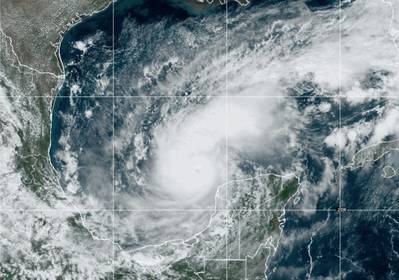Ports Restrict Navigation, Some Oil Facilities Shut as Milton Approaches Florida
At least one oil and gas platform in the U.S. Gulf of Mexico was shut on Monday and Florida ports imposed restrictions on vessel navigation as Hurricane Milton rapidly intensified.
Most energy infrastructure on the U.S. Gulf Coast, including oil and gas production facilities, liquefied natural gas (LNG) plants and refineries, is expected to be out of the storm path, but the closure of terminals could temporarily disrupt exports and imports.
Florida was the sixth largest state exporter of goods last year, according to the Office of the U.S. Trade Representative.
Meteorologists forecast 10 to 15 feet (3.05 to 4.57 meters)of storm surge, 120 miles per hour (mph) to 140 mph wind gusts and say more than 2 feet of rain is possible along the Florida Gulf Coast in the area Milton makes landfall, probably near Tampa.
President Joe Biden approved an emergency declaration for Florida.
The U.S. National Hurricane Center said on Monday the storm will approach the west coast of the Florida Peninsula by Wednesday after becoming a powerful Category-5 hurricane on the Saffir-Simpson scale.
Electricity provider Duke Energy said it was mobilizing about 10,000 responders in Florida as it prepared for more than 1 million power outages associated with Milton.
U.S. energy producer Chevron said on Monday that all staff from its Blind Faith platform in the Gulf were transported and the facility had been shut.
Blind Faith, located 160 miles (257.5 km) southeast of New Orleans, is Chevron's deepest water development in the world. It produces oil from four wells and has two flow lines that route crude and gas to a platform moored in 6,500 feet of water.
Production from Chevron's other operated Gulf of Mexico assets remained at normal levels, it added.
The U.S. Coast Guard has imposed restrictions to vessel navigation since Saturday at most Florida ports, including Tampa, St. Petersburg, Fort Myers, SeaPort Manatee, Panama City, St. Joe, Key West, Port Canaveral, Jacksonville and Fernandina.
Large oceangoing vessels, including tugs and barges, already in port or arriving shall continue with preparations and safely depart the ports before closure, the Coast Guard said in an advisory on Sunday.
Other ports in Florida, Mississippi and Alabama that handle oil and fuel imports and exports, including Pensacola, Pascagoula and Mobile, remained open on Monday, the Coast Guard said.
LNG facilities on the U.S. Gulf Coast are mostly out of the storm path. However, the United States exports marginal volumes of LNG in ISO containers from the ports of Miami and Fort Lauderdale data from the U.S. Energy Department shows.
(Reuters - Reporting by Marianna Parraga and Curtis Williams, and Rahul Paswan and Anushree Mukherjee; editing by Barbara Lewis)















